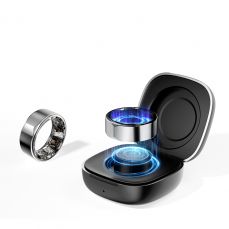Jan. 16, 2024
Timepieces, Jewelry, Eyewear
Smart health rings, designed to monitor various health metrics and provide insights into users' well-being, can be effective tools for health tracking. However, the efficacy of these devices depends on factors such as the technology used, the accuracy of sensors, and the specific health metrics being monitored. Here are some considerations regarding the functionality of smart health rings:
1. Health Metric Monitoring:
Heart Rate Monitoring: Many smart health rings offer continuous heart rate monitoring, providing insights into resting heart rate and changes during different activities.
Sleep Tracking: Some smart rings track sleep patterns, including duration, sleep stages, and disruptions, contributing to better sleep management.
Activity Tracking: Smart rings may monitor steps taken, distance traveled, and calories burned, encouraging users to stay active.
2. Accuracy of Sensors:
Optical Sensors: Most smart health rings use optical sensors to measure heart rate and other vital signs. The accuracy of these sensors can vary, and factors such as fit, skin tone, and motion can impact readings.
Additional Sensors: Some rings incorporate additional sensors, such as accelerometers and gyros, to enhance accuracy in tracking physical activities and sleep patterns.
3. Wellness Insights:
Stress Tracking: Certain smart rings for health include stress tracking features by analyzing heart rate variability (HRV) or other biometric data. This can provide insights into users' stress levels throughout the day.

Recovery Metrics: Some rings aim to assess users' recovery status, considering factors like heart rate variability and sleep quality, to help optimize training and activity.
4. Form Factor and Wearability:
Comfort: Smart health rings are typically designed to be lightweight and comfortable for extended wear. Comfort is crucial for consistent usage, especially for sleep tracking.
Water Resistance: Many smart rings are water-resistant, allowing users to wear them during activities such as swimming or showering.
5. App Integration:
Companion Apps: The effectiveness of smart health rings often relies on the associated mobile apps. These apps provide detailed insights, trends, and data visualizations, contributing to a comprehensive understanding of health metrics.
Compatibility: Ensure that the smart ring is compatible with your smartphone and integrates seamlessly with the health and fitness apps you prefer.
6. User Experience:
Ease of Use: Smart rings should be user-friendly, with intuitive interfaces and simple controls. This ensures that users can easily navigate through features and settings.
Battery Life: Consider the battery life of the smart ring. Longer battery life is beneficial, especially for devices that offer continuous monitoring.
7. Limitations:
Medical Grade Accuracy: While smart health rings provide valuable insights, they are not medical devices and may not offer the same level of accuracy as professional medical equipment.
Limited Screen Size: Due to their compact size, smart rings may have smaller displays compared to other wearables, potentially limiting the amount of information presented.
In summary, smart health rings can be effective tools for health tracking, providing valuable insights into various metrics. However, users should be aware of the technology's limitations and consider their specific health and fitness goals when choosing a smart ring. Regular updates, advancements in sensor technology, and user feedback contribute to the continuous improvement of these wearable devices.
Previous: Revolutionizing Healthcare: The Ultimate ECG Spo2 Smart Tracker
Next: Which Jewelry Trends Are Rocked by 2x4mm Purple Pyrite Disc Gemstone Beads?
If you are interested in sending in a Guest Blogger Submission,welcome to write for us!
All Comments ( 0 )